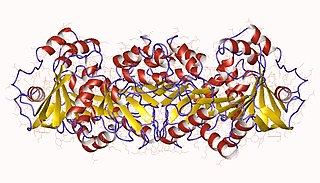| 2-methylcitrate dehydratase | |||||||||
|---|---|---|---|---|---|---|---|---|---|
| Identifiers | |||||||||
| EC no. | 4.2.1.79 | ||||||||
| CAS no. | 80891-26-5 | ||||||||
| Databases | |||||||||
| IntEnz | IntEnz view | ||||||||
| BRENDA | BRENDA entry | ||||||||
| ExPASy | NiceZyme view | ||||||||
| KEGG | KEGG entry | ||||||||
| MetaCyc | metabolic pathway | ||||||||
| PRIAM | profile | ||||||||
| PDB structures | RCSB PDB PDBe PDBsum | ||||||||
| Gene Ontology | AmiGO / QuickGO | ||||||||
| |||||||||
The enzyme 2-methylcitrate dehydratase (EC 4.2.1.79) catalyzes the chemical reaction
- (2S,3S)-2-hydroxybutane-1,2,3-tricarboxylate (Z)-but-2-ene-1,2,3-tricarboxylate + H2O
This enzyme belongs to the family of lyases, specifically the hydro-lyases, which cleave carbon-oxygen bonds. The systematic name of this enzyme class is (2S,3S)-2-hydroxybutane-1,2,3-tricarboxylate hydro-lyase [(Z)-but-2-ene-1,2,3-tricarboxylate-forming]. Other names in common use include 2-methylcitrate hydro-lyase, PrpD, and 2-hydroxybutane-1,2,3-tricarboxylate hydro-lyase. This enzyme participates in propanoate metabolism.





